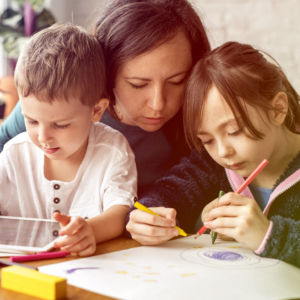Editor’s Note: For another viewpoint, see Counterpoint: Parents Who Homeschool — a Clear and Present Danger
Most of the nation’s schools have closed to mitigate the spread of COVID-19, and there’s no certainty on whether they’ll be open next school year.
In this sense, we’re essentially all homeschoolers now.
The pandemic’s effect on the education system is forcing millions of families to evaluate their current schools and the merits of homeschooling. And perhaps because of this re-examination, government school monopolists are attacking homeschooling — just as everyone is doing it.
For some enemies of educational freedom, the fundamental issue is about who is in the best position to decide how children should be educated.
One of the major threads in the criticisms of alternatives to public schools — from private schools to homeschooling — is the suggestion that families, especially low-income families, are somehow incapable of making good decisions for their own children and that those decisions should, therefore, be in the hands of the government.
For example, in a recent article calling for a ban on homeschooling, Harvard University’s Elizabeth Bartholet claimed that “many homeschooling parents are simply not capable of educating their children.”
However, this view that the government knows better than families is deeply flawed.
Parents are legal stewards of their children, with responsibility for their well-being.
The nature of the parent-child relationship, including both the amount of, and kind of, time spent together gives parents superior knowledge about their children. In addition, parents are given the most credit when children are raised well, and parents also pay a social price when kids are uneducated or misbehave.
Parents are assumed, rightly, to be responsible for the upbringing of their kids; thus they have particularly strong incentives to do it well, even if parenting is challenging.
The Supreme Court recognized this point in Pierce v. Society of Sisters in 1925, a case that not only weakened a state monopoly on education but also established the constitutional status of parental rights. Writing for the court, Justice James Clark McReynolds wrote, “The child is not the mere creature of the State.”
Parents are not perfect, and arguing that they have better knowledge and incentives than education bureaucrats is not to say that families will never make mistakes. Families simply are more likely to get it right and are in a better position to learn and respond when they get it wrong.
In the realm of education, we see these ideas play out in a number of ways. First is the emphasis on parental choice. Homeschooling, or even formal private schooling, might not be the optimal choice for every single child. Rather, the point is that families are in the best position to determine what sort of educational structure is best for their kids.
This might explain why the most rigorous evidence consistently shows that home school students generally fare better academically and social
The school shutdowns caused by the coronavirus pandemic are forcing millions of parents to figure out if homeschooling can work better than government schooling.
In fact, a new EdChoice-Morning Consult poll of 510 parents of school-age children finds that 56 percent of parents have a more favorable view of homeschooling and just 26 percent have a less favorable view of homeschooling as a result of COVID-19.
Parents are not perfect, but they generally know what’s best for their kids. Unfortunately, the hubris of the educational establishment in thinking that distant bureaucrats know better that parents will likely continue to condemn too many children to suboptimal educational experiences.
The coronavirus pandemic and significant economic downturn may force states and school districts to change their funding systems. Let’s give families a real opportunity to make decisions — allowing them to take their children’s education dollars to wherever they think they can get the best education and environment, whether that’s a public school, a private school or through homeschooling.
Let’s fund students, not systems.

